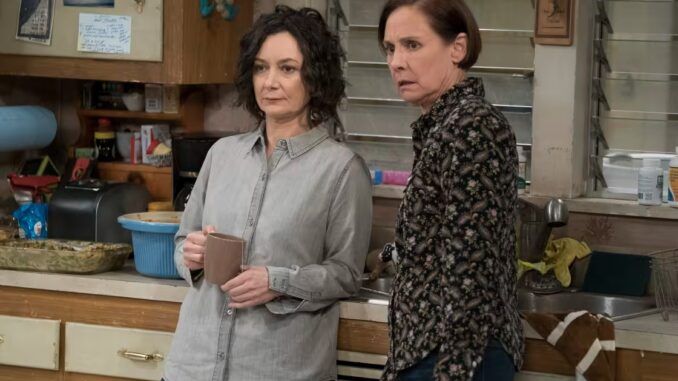
In the realm of American television, few shows have had the cultural impact of “Roseanne.” Originally airing from 1988 to 1997, it carved out a niche for itself by depicting the everyday struggles of a working-class family. When the show was revived in 2018, it generated both excitement and controversy, particularly following the unexpected departure of its star, Roseanne Barr. This pivotal moment led to the creation of “The Conners,” a spin-off that not only continued the story but also redefined the family dynamics and themes that made the original series so beloved.
The Evolution from “Roseanne” to “The Conners”
The transition from “Roseanne” to “The Conners” was not merely a change in title; it represented a fundamental shift in narrative focus. With Barr’s character removed from the equation, the show had the opportunity to delve deeper into the lives of the remaining family members. By shifting the spotlight to Dan, Darlene, Becky, and their children, “The Conners” embraced a more ensemble-driven format. This allowed for a richer exploration of each character’s challenges, triumphs, and growth, making the show feel both fresh and familiar.
Resilience in the Face of Adversity
At the heart of “The Conners” lies a powerful theme of resilience. The family faces significant challenges, including the loss of their matriarch and the financial struggles that plague many working-class households. Each character embodies a different aspect of resilience, showcasing how they cope with life’s difficulties.
Darlene, played by Sara Gilbert, emerges as a central figure. Her transformation from a rebellious teenager to a struggling single mother resonates with many viewers who face similar challenges today. Darlene’s journey highlights the pressures placed on women to balance career aspirations and family responsibilities—a theme that is both timely and relatable.
Dan, portrayed by John Goodman, steps into a more prominent role as a father navigating grief and responsibility. His character’s evolution adds depth to the narrative, revealing vulnerabilities that make him more relatable as he strives to keep the family unit intact.
The Dynamics of Family Relationships
One of the standout features of “The Conners” is its exploration of complex family relationships. The show skillfully depicts the bonds that hold the family together, even in the face of adversity. The sibling dynamic between Darlene and Becky (Lecy Goranson) is particularly noteworthy. Their interactions reflect the love and rivalry typical of sibling relationships, showcasing how they support one another while also dealing with their differences.
The younger generation, represented by Harris and Mark, adds another layer to the family dynamic. Their experiences—navigating identity, peer pressure, and the complexities of adolescence—bring a contemporary perspective to the show. By including these characters, “The Conners” resonates with a broader audience, bridging generational gaps and showcasing the universal challenges of growing up.
Humor as a Coping Mechanism
Despite the serious themes, “The Conners” retains the signature humor that characterized its predecessor. The comedic elements serve to lighten the mood, providing a necessary balance to the show’s weightier topics. This blend of humor and heart is crucial, allowing characters to navigate their struggles while finding moments of joy and levity.
The witty banter and situational comedy reflect the Conners’ ability to find laughter amid chaos. Whether it’s Dan’s dry humor or Darlene’s sarcastic remarks, the comedic timing fosters a sense of familiarity and warmth. This approach not only honors the legacy of “Roseanne” but also reinforces the idea that humor can be a powerful tool for coping with life’s adversities.
Addressing Contemporary Social Issues
“The Conners” also serves as a platform for discussing relevant social issues that resonate with today’s audience. From economic hardships to healthcare access, the show addresses real-world challenges faced by many families. By weaving these themes into its narrative, “The Conners” transcends traditional sitcom boundaries, becoming a reflection of societal realities.
The portrayal of addiction, particularly through Becky’s struggles, is a poignant example. By addressing this sensitive topic with nuance, the show contributes to the ongoing conversation about mental health and recovery, offering hope and understanding to viewers who may relate to these experiences.
The Role of Community
Another important aspect of “The Conners” is its depiction of community. The characters often rely on their neighbors and friends for support, highlighting the importance of social connections in overcoming life’s challenges. This sense of community not only enriches the narrative but also reinforces the idea that no one has to face their struggles alone.
The show illustrates how families are often intertwined with their communities, showcasing the importance of solidarity and shared experiences. Whether it’s through humorous neighborhood interactions or heartfelt moments of support, “The Conners” emphasizes the value of connection in navigating life’s ups and downs.
Conclusion: A New Legacy for the Conner Family
“The Conners” stands as a testament to the enduring legacy of “Roseanne.” By embracing a fresh narrative while maintaining the essence of the original series, it captures the complexities of family life in modern America. The themes of resilience, humor, and social relevance resonate with audiences, ensuring its place as a significant contribution to contemporary television.
As the Conner family continues to navigate the challenges of life, viewers are reminded of the power of family, laughter, and community. In an increasingly divided world, “The Conners” offers a glimpse into the shared experiences that unite us all. This is not just a story about a family; it reflects the struggles and triumphs that define the human experience. With relatable characters and heartfelt storytelling, “The Conners” proves that even without Roseanne, the spirit of the Conner family lives on, adapting and thriving in an ever-changing world.
